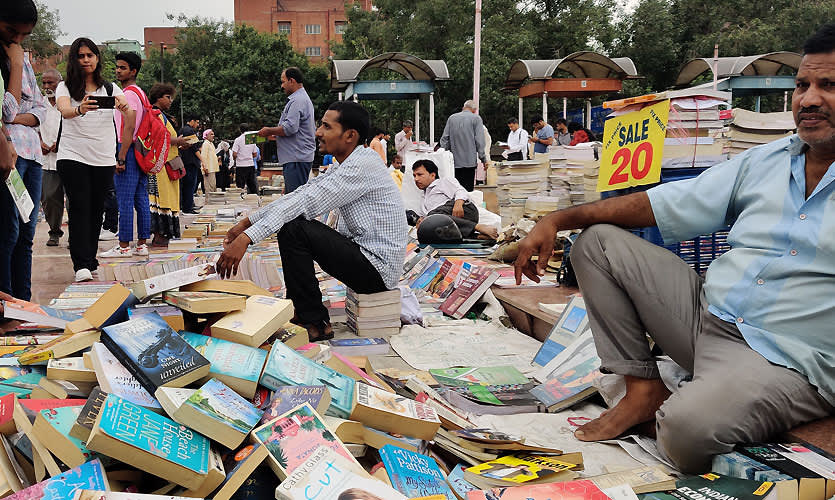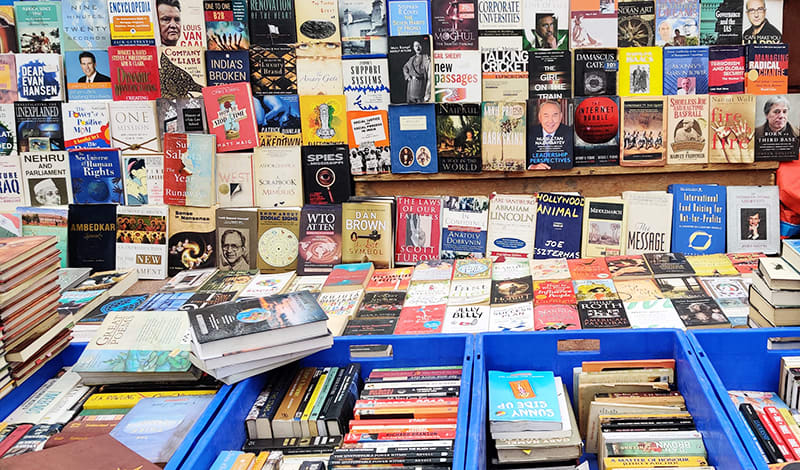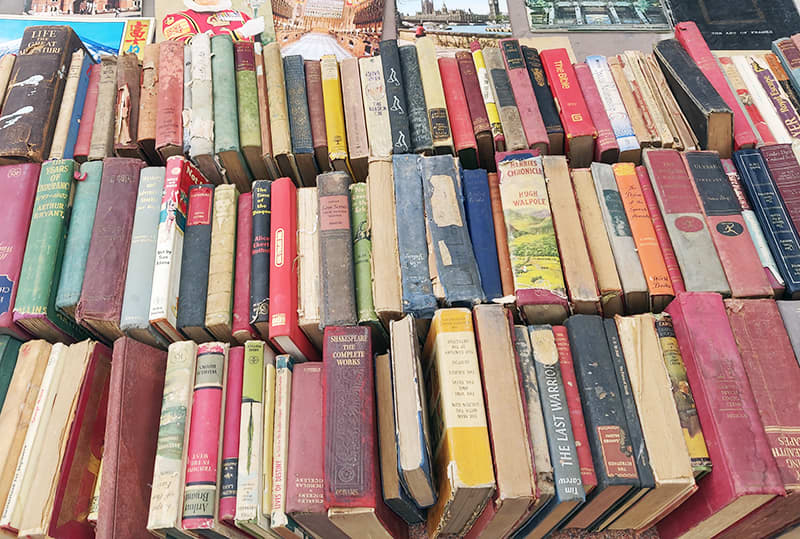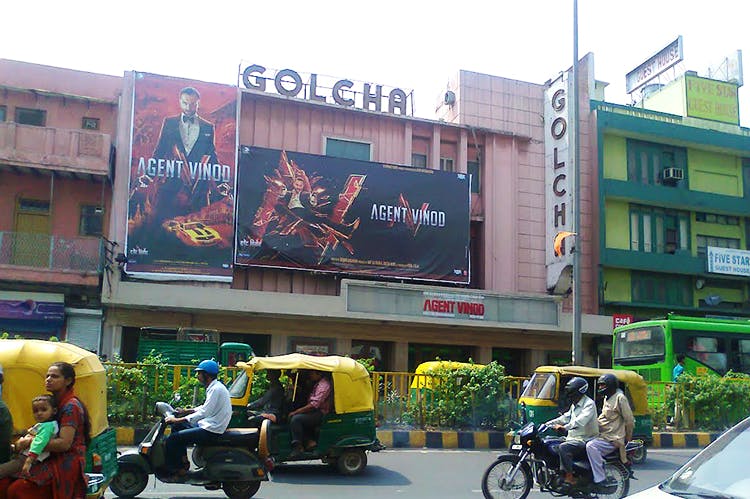Sunday Book Bazaar of Daryaganj
“To a bibliophile, there is but one thing better than a box of new books, and that is a box of old ones.”
― Will
Thomas, Some Danger Involved
He was the first and the most
committed bibliophile I met.
We were posted in the same
hospital. He was not a doctor, but as is known in the military medical fraternity, a non-technical officer.
Till then, I owned very few books
– mostly fiction and a smattering of volumes on Indian philosophy. Latter were
so obscure that I had not read more than a few pages of any.
A succession of events about this
time changed the world of my reading.
We bought our first personal
computer. Within a few months, internet too arrived home. JK Rowling’s Harry Potter and The Philosopher’s Stone was
tremendously popular then, especially among children. My kids learned
of a new mode of buying books – an online bookshop. I ordered the book at
indiaplaza.in.
A colleague lent me Bill Bryson’s
A Short History of Nearly Everything.
I read the book entranced. Before, I had never read a nonfiction book from
first page to the last. Book’s bibliography opened the doors beyond which lay
an illimitable treasure. I was dizzy contemplating the eternal feast this
promised: evolutionary science, astronomy, religion, psychology, travel,
history, biography. My wish-list for books ballooned overnight. Internet,
specifically indiaplaza.in, helped me to put a little of it on my bookshelves.
It now seems that chance truly
conspired to unveil and stoke my bibliomania in those halcyon days. I read each
book with a jaw-dropping wonder. A lively universe of staggering thoughts, infinite in variety and expanse, throbbed next to me. And
all the while I had been smugly content in my ignorance.
Whenever I met my bibliophile
colleague, we talked books. I was awed by his knowledge of books, and his vast
collection of books. We were soon posted to different stations.
I was in Delhi for a few
weeks on an official tour. I knew he too was posted there, staying near
the place I was lodged. On an evening I walked to his house. Earlier, I had
only heard him talk about his books. I glimpsed a little of these now. He lived
in a small two-bedroom flat – government accommodation in Delhi is exceedingly
difficult to comeby. There was little room to move around the house. There were
books where ever a little retreat for them was obtained – on the refrigerator,
on the side tables, in a corner rack, beneath the centre table. But the only balcony
in the house – protected from the elements by glass windows – was drowned in
books. Few large trunks lined the walls. Great heaps of books rose on each.
‘I haven’t seen so many books in a home. How many do you have?’ He smiled,
‘Perhaps 5-7000. But I left all at my house in Agra, when I came to Delhi.
These are the ones I bought here.’
Once he took me to the bookshops nearby that he visited regularly. In one of the shops, he lingered over a coffee-table book. I think, it was on Himalayas. He was fascinated by books on mountains, he had told me. His passion for books was boldly written on his face. He tenderly flipped the pages. There was lust in his eyes. ‘Shall I pack it tonight?’ asked the shop owner. Book was expensive . ‘No, I will come again. Perhaps you will let me pay in instalments.’ On way out he said ruefully, ‘It’s costly Rajiv. I can’t afford it’. On my next visit to his place, I saw the book on the top of a pile. He looked at me and grinned, ‘I had to have it’.
He told me that he also bought
books at the Sunday book bazaar of Daryaganj. I had heard about it fleetingly.
‘Oh, you have not seen the Sunday bazaar? Its not to be missed. I’ll take you
there’.
Daryaganj, meaning market near a
river, was known as Faiz bazaar in Mughal times. Yamuna then, flowed not far from it.
Allegedly, a canal carrying Yamuna water ran in the centre of the wide
boulevard. Within the walled city of Shahjahanbad, it lay on its
eastern border, beginning at Delhi Gate and stretching till the Red Fort. It
housed the original British cantonment, where a native Delhi garrison was
stationed since 1803. This was later shifted to the Ridge area. Nai Sarak in
Daryaganj is one of the largest books market in country and hosts many
publishers like, Rajkamal, Oxford University Press. Sunday book bazar started
in 1964. It was then known as Daryaganj Sunday Patri Kitab Bazaar.
Next Sunday, my friend came to my place on his scooter in the afternoon. It was summer and Delhi roads were sizzling. He stopped by the side of a foot path, that bordered a wide road. Road was empty at this hour, but the footpath swarmed with people. Huge mounds of books lay strewn everywhere, from one end of the path to the other, a stretch of hundreds of metres. ‘But how can one search for books in this sea?’ ‘Just scan the piles. Something will catch your fancy.’ He smiled and prodded me. For long I eyed the books without seeing the title of any. But this won’t do. I must begin at some place. I chose a mound that had fat books with dull spines – unlikely to be potboilers, I reasoned. One caught my eye – Ted Morgan Maugham. I didn’t know the book. But the name of Maugham was sufficient. Seven-hundred-:pages hardbound book was a biography of Somerset Maugham. This must be expensive. Though the dust cover was missing, book was in excellent shape. When the hawker quoted his price, I was dumbfounded.
It was hot. My friend sat on the
scooter sweating. But smiled and edged me on. A few feet ahead I spotted a neat
stack of coffee table books and scanned their titles. ‘Somerset Maugham –
Anthony Curtis’ stared at me beseechingly. I did not know this either – I had
not read any biography of Maugham till then. This copy even had a dust cover.
Price? It would shame the most hardboiled penny-pincher.
I was weak-kneed by the
excitement. I had found two books on an author I adored, within a few minutes.
What a welcome! Were I a believer, I would have seen hands of a benevolent
providence behind this uncanny chance.
I was hooked to the Sunday
book bazaar. We now went to Daryaganj on every Sunday, for the remaing few
weeks I was in Delhi. I had to purchase a big duffle bag to carry the haul of
30-40 books.
Next, I was posted to a small
hospital on the eastern fringe of the sprawling National Capital Region. Yamuna hugged this border of the capital.
Daryaganj lay across the river.
I waited for the pleasant Delhi
winter to set in and evolved a routine that I followed for many years. On a
Sunday morning, I drove to the nearest metro station at Dilshad Garden. Parking
my car here, I boarded the Red Line metro, changed for Yellow Line at Kashmire
Gate, and got off at Chawri Bazar.
On a Sunday morning, the usually chaotic, narrow streets of bazaar were quite. Most shops were closed. Chawri
bazaar is today famous as a whole sale market of wall papers, gift wrapping
paper, office stationary, and wedding cards. A century back, it was a prominent
promenade in the walled city. Rich came to walk here in the evenings. First
floor above the shops housed kothas of famous singers,
the courtesans of Delhi. Victorian mores imposed on an alien culture saw these bastions of classical music and dance, turn into brothels, which were
later closed.
Leaving the cramped lanes of old city, I emerged in the expansive – but equally crowded and noisy – stretch of New Delhi at Asaf Ali Road. As I walked jauntily, in the balmy sun of Delhi winter, I passed by Delite Cinema, one of the oldest and still running, single-screen cinema halls of Delhi. It opened in 1954 with Raj Kapoor’s Angaarey. It’s façade of fading walls, though once bright and garishly stuccoed, is like numerous other theatres scattered in every town and city in the country - most derelict and abandoned but many resplendent in their new avtaars as glittering shopping malls. A little distance ahead was the iconic Broadway hotel. It once housed the popular Thugs bar and the Chor Bizarre restaurant. Latter was decorated by an art curator with bric-a-brac retrieved from country’s traditional ‘thieves’ markets’. Hotel opened in 1956. Corona proved fatal for its health and it was closed post-pandemic in 2020.
I came fortified with a big knapsack. I had walked about half an hour to reach Asaf Ali Road, a distance of 2-3 kms. The book bazaar began at the door step of Delite. It began in a trickle, a stray hawker would spread his measly ware of old magazines and bedraggled books on the steps of the cinema and Broadway. But within a few metres, bazaar turned into a deluge. Books now lined, piled, tumbled over, littered, spilled, and damned the broad side walk, till the farthest edge of the road that ended at Delhi Gate. It was a veritable ocean of books.
I stepped into this world with a palpitating heart and invigorated spirits. I would initially linger over every stall and often pick up a book or two even from the jumble of two-penny novels. As the goods of the sellers increased so did the crowd and the quality of books. I soon learned that it was not possible to survey all the books of a seller. I would choose a pile that attracted me by the looks of its books and few names that appealed. I would scrutinise such stack more carefully and often find a good book or two. I would then move on to the next vendor. There were days when I was particularly lucky. But never did I turn back because of paucity of books of my taste; It was the growing weight of the rucksack and fatigue of a long day that forced my feet homeward.
Sight of books spread till the
farthest reach of eye warmed the cockles of a book lover’s heart. Congregation
of scores in pursuit of the same love was like a pilgrimage. Prominent
historical ties of the place lent a mystique to the jaunt and search of books
became an exciting goal in itself, to be undertaken for the joys it begot.
Never ever short, my means kept
pace with my growing passion for books. But I cannot deny the thrill I derived
from the preposterous bargains that were offered at book bazaar.
With time, I came to know the
sellers who stocked the books of my choice. They too recognised me and would
extract a Dawkins, Pinder, Guha, or Dalrymple which had arrived new in their
collection, the moment they saw me. List of fabulous books I bought at
Daryaganj is endless: E.H. Carr's What Is
History, Richard Dawkins' The
Greatest Show On Earth, Steven Pinker’s Stuff
Of Thought, Richard Rhodes’ The
Making Of The Atom Bomb, A.J.P. Taylor’s The Origins Of The Second World War, Percival Spear’s A History Of India, V.S. Ramachandran's The Tell Tale Brain, John Barrow’s The Infinite Book, Leonard
Susskind’s The Cosmic Landscape, Bruce Chatwin’s Patogonia, Churchill's war memoirs.
There were books for every palate. Potboilers in paperback - most widely read books - abounded. But, with patience, and a little diligence, one could consistently find gems in this dime-a-dozen stuff too. There were stalls that had only text books, on every conceivable subject: languages, maths, science, economics, management, medicine, engineering. Some stalls specialized in niche magazines like Vogue, Elle Decor, Times, The Week, National Geographic. Others stocked only hardbound books, while a few had only children books, comics and graphic novels, and many flaunted an extravagant collection of coffeetable books. I found three volumes of David Attenborough's Life Trilogy, a rare book of the English travel writer Eric Newby's black and white photographs, a couple of books on English countryside and World-wars, all dirt-cheap.
I was introduced to new writers
and new genres. Each such book spawned many more and my reading arena blossomed
fulsomely. At least one book of every author I admire, has been purchased from
Daryaganj. Of some the complete oeuvre, like James Herriot. Daryaganj was also
a place where enthusiasts could find rare first editions of popular books at a
bargain, and occasionally because the seller was unaware of book's value. I
didn't have such interest and didn’t look for them. Only rare edition that
landed in my kitty was a strange looking book of Malcolm Gladwell, David And Goliath. A careful examination
revealed it was an ‘Exclusive limited edition proof’ which was ‘UNCORRECTED’
and ‘NOT FOR RESALE’. First page had Gladwell's note to booksellers, not to
readers. Unsure of its worth, I covered it like others and consigned it to its
place on the bookshelf. Like numerous others, I'm still to read it.
Soon I reached the end of Asaf Ali Road at Delhi Gate. This is one of the four remaining gates of the original fourteen, that guarded entry into the walled city. Delhi Gate was constructed in 1638 by Shahjahan. Bazaar turned left on to Netaji Subhash Marg here. A bustling street-food joint thrived where the road looped. Air was redolent with smell of fried food: Bread pakora, chole bhatoore, gulab jaamuns. Now the sidewalk became narrow and the crowd dense. You were pushed this way and that as you examined books at a stall.
My backpack now bulged grotesquely and its straps dug into my shoulders. I had been walking for nearly three hours. It was my habit to stop at a small roadside restaurant that sold south-Indian fare. I would take a lonely bench and deposit the rucksack by my side. Then, I would extricate the books, one by one, and joyfully look at the purchase of the day.
I now came to Golcha cinema,
another landmark of the newly formed republic in 1950s, a single-screen theatre
that too opened in 1954, and closed a few years back. Book bazaar ended at Brij
Mohan chowk, a short distance ahead of the famous Moti Mahal restaurant. Moti
Mahal, established in 1947, claims to have invented Butter-chicken, the most
popular chicken-dish of India, in and outside country.
I would walk on, soon wading into the milling crowds at another flea market along Jama Masjid. Winter sun hung low now. To my right, sandstone ramparts of the majestic Red Fort glowed brightly in the rays of setting sun. On my left was the dark silhouette of the Bird’s hospital, buzzing with cacophony of hundreds of fluttering birds on the trees in its compound. Here I turned onto Chandni Chowk. Devotees would be washing the floor of the revered Sheesh Ganj Gurdwara after the Sunday langar. Gurdwara was constructed in 1783 to commemorate 9th Sikh Guru shri Tegh Bahadur Singh's martyrdom. Near the entrance of the Paranthewali gali, stood the old Ghantewala halwai’s sweet shop. It had opened in 1790 and closed in 2015, but was still in business at the time, I write about. I would often eat Dahi-bhalle at the famous Natraj Dahi Bhallewala, which was young among these ancients, born only in 1940.
Ride in metro, from Chandni Chowk
to Dilshad Garden, passed in reverie of the books I had found.
Back home, I spent hours reading
preface, forewords, and blurbs of each book. On an average my catch numbered
12-15. There had been occasions, I remember vividly, when I brought home about
thirty books.
My son accompanied me on some Sundays. We would then drive to Asaf Ali Road and park the car in the huge, dark, dank, and dusty MCD basement parking. My son knew my taste in reading and was conversant with the books in my collection. Four eyes, instead of two, doubled the output on these occasions. Mughalai restaurants, Zaika and Changezi, near Golcha, held an added attraction for him. We would gorge on seenkh kababs, Afghani and Changezi chicken, with roomali and khamiri rotis.
I was deeply saddened when I
learnt that the Daryaganj Sunday book bazaar would soon be closed and relocated
at a new venue. Though I had known it only for a little more than a decade, it
felt as if a town one had grown in was to be demolished.
Culture is a singular attribute
of our species, not seen in any other on earth. Books are the most vibrant,
varied, and representative form of human culture. No civilisation can prosper
without books. Crowded bookshops and libraries in a town speak about its lively
and aware people leading a fulfilling life. Space for books in a city –
libraries, shops, flea markets, exhibitions – are lungs for the
survival of its culture, not unlike the green spaces for the health of its
citizens. Most cities in the world have their second-hand book markets viz.,
Southbank Centre Book Market in London, Hay-on-Wye in Wales, El Rastro in
Madrid, Saint Ouen flea market in Paris.
The old iconic secondhand book markets of our cities, like College Street in Kolkata, Fountain in Mumbai, Daryaganj in Delhi, have either been relocated or live under a constant apprehension of their imminent demise. These are cultural heritage of our cities. They are not merely a collection of stalls and hawkers selling old books. They are inseparable from the locale they grew in and prospered. The street, the bazaar, the footpath that has sheltered them for decades or centuries, is inextricably mingled in their character. Unrooted from their native soil these flea markets will wither away.
Footpaths of Asaf Ali Road and Netaji Subhash Marg, from Delite cinema to Golcha cinema, no longer house the Sunday book-bazaar. It has been relocated to Mahila Haat, a cleaner, sanitized, bland and sterile, cemented ground near the old venue. The old Daryaganj Sunday Patri Kitab Bazaar is now a haat, a huge, openair exhibition space, the Sunday book market.









Great imagery & Nostalgia!
ReplyDeleteThe vivid description of the site and sound of sunday book market brings back sweet memories of that place. You have described the transformation of the book market very well, even I didn't feel like returning to mahila haat after my first visit.
ReplyDeleteHave stayed in the area fairly close to that on my childhood and had the opportunity to go there often, hunting for books and at that time stamps which was a hobby I nurtured. Have very fond memories of it and would miss it. Although saying it means that life was better in those times
ReplyDelete